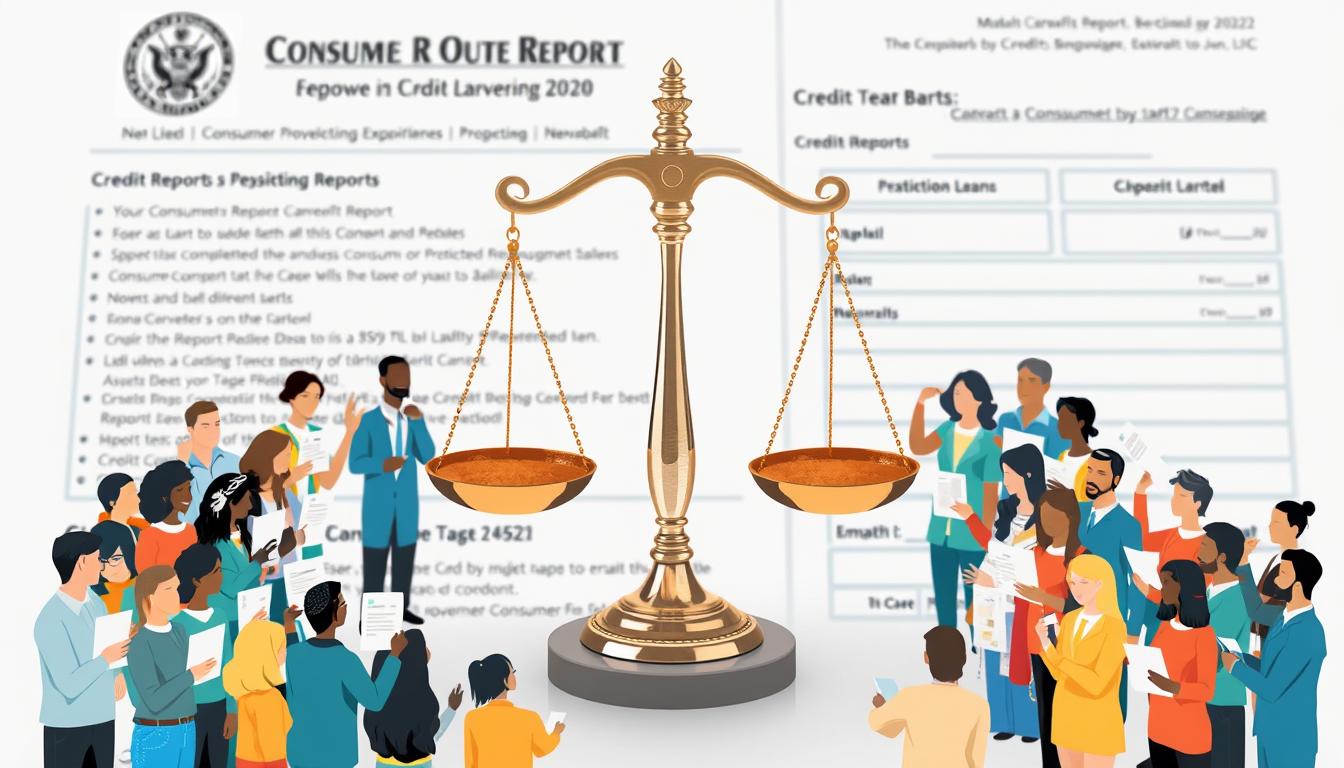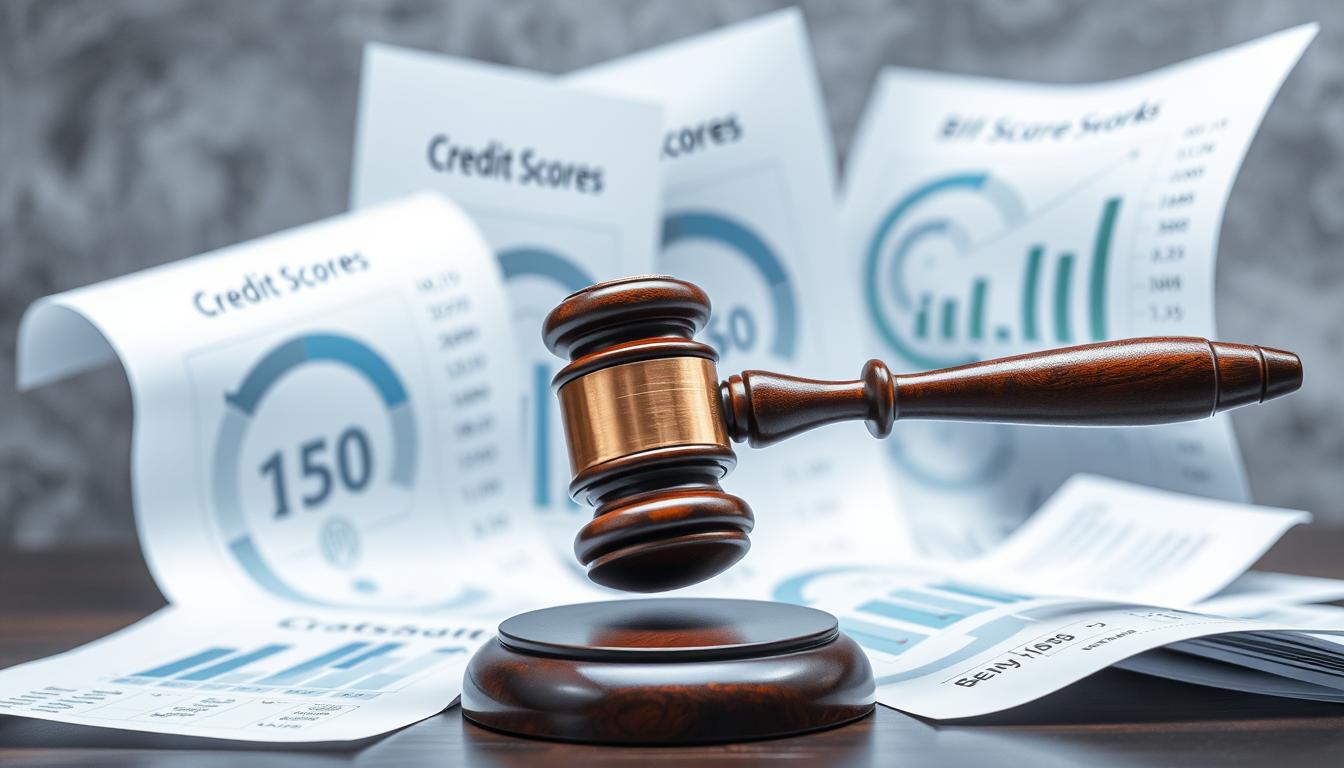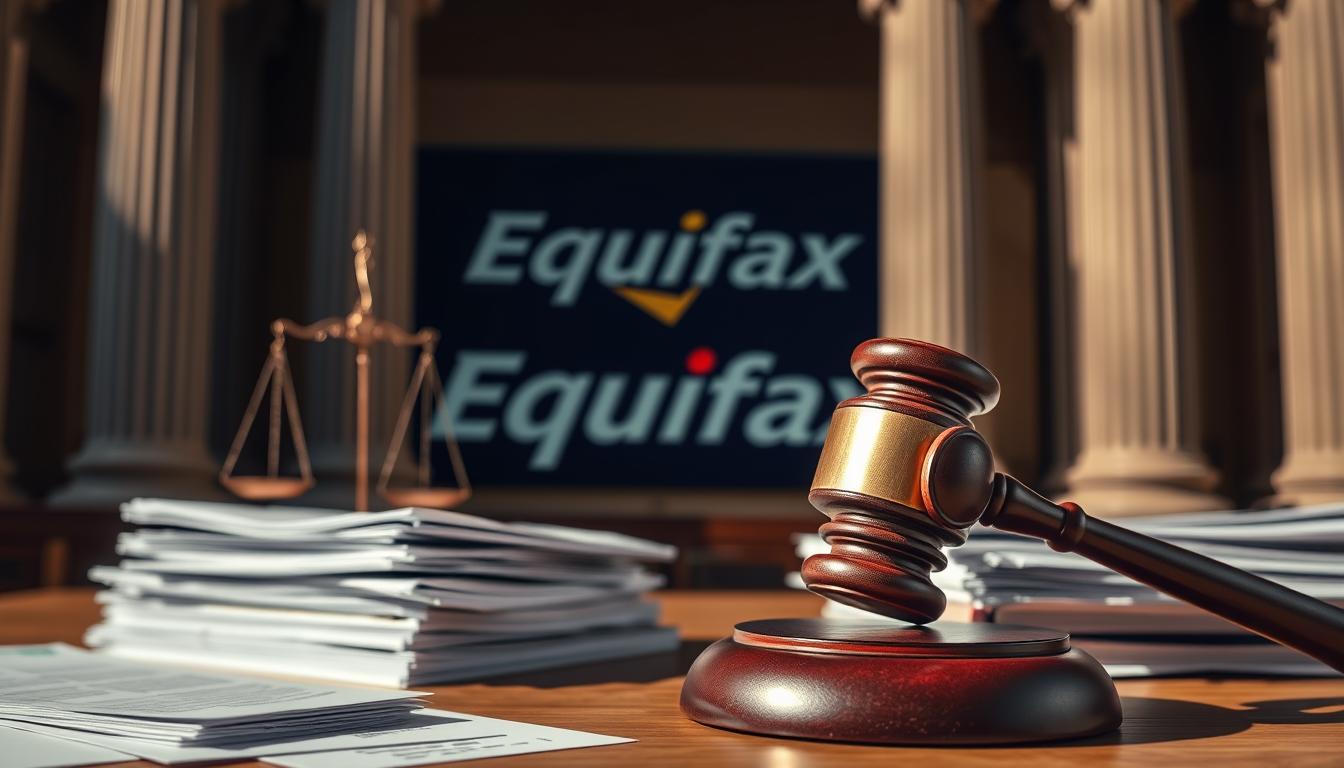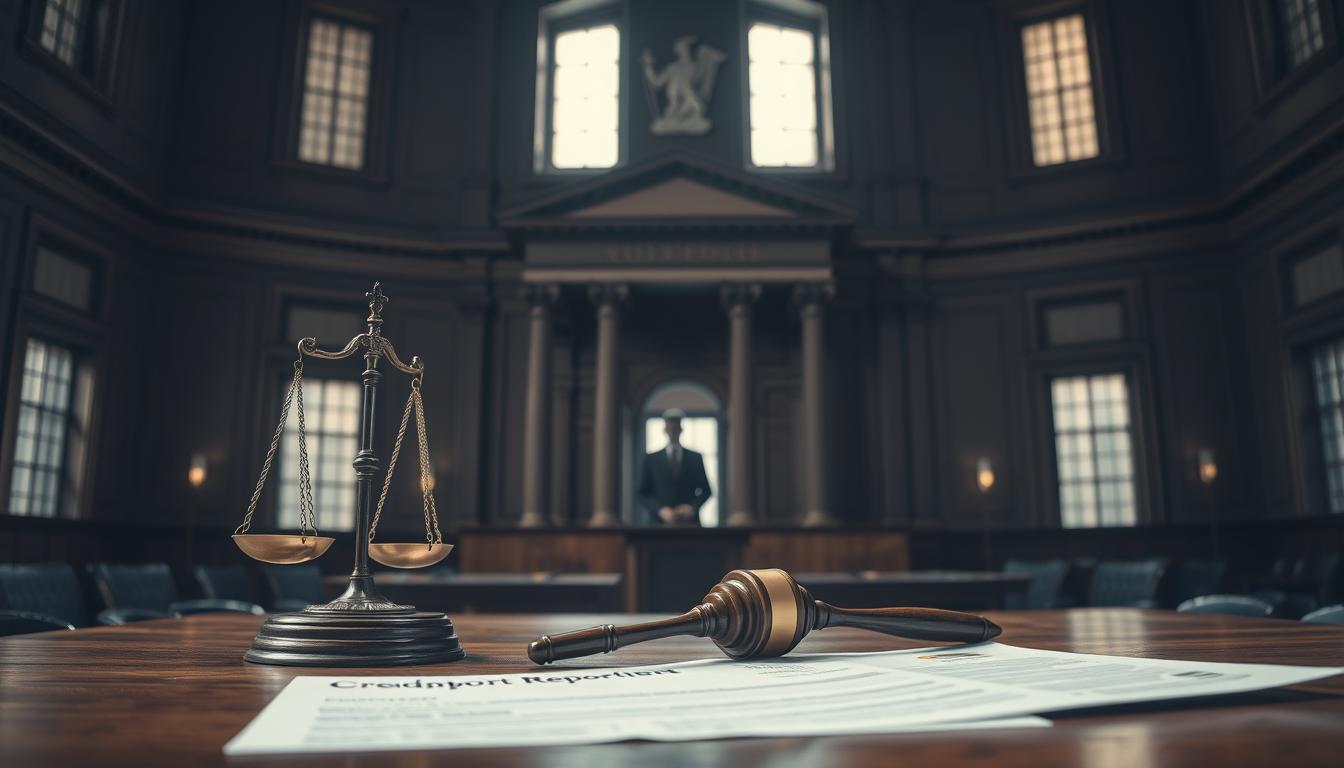Equifax credit report issues can be grounds for legal action. These may include inaccuracies, errors, or data breaches. This guide outlines the process of suing Equifax.
We’ll cover understanding your consumer rights and initiating a lawsuit. You’ll also learn about seeking compensation for credit report problems.
Key Takeaways
- Familiarize yourself with the Fair Credit Reporting Act (FCRA) and Equifax’s legal obligations
- Identify and document any inaccuracies or errors in your Equifax credit report
- Dispute the errors with Equifax and provide supporting documentation
- Understand the grounds for a lawsuit against Equifax, such as willful violations or data breaches
- File a lawsuit within the applicable statute of limitations
- Seek legal representation to maximize your chances of success and compensation
- Explore potential damages, including actual, statutory, and punitive damages
Understanding Your Rights as a Consumer
The Fair Credit Reporting Act (FCRA) outlines your rights as a consumer. This federal law protects equifax consumer rights and ensures accurate, secure equifax credit report problems. It’s important to know these rights.
Fair Credit Reporting Act Provisions
The FCRA gives consumers several key rights. These include accessing credit reports and disputing inaccuracies. It also holds credit reporting agencies accountable for violations.
The fair credit reporting act allows you to get free annual credit reports. You can dispute incorrect information and have it fixed. The act limits what can be included in your report.
- The right to obtain a free copy of your credit report annually from each of the three major credit bureaus, including Equifax.
- The right to dispute any inaccurate or incomplete information on your credit report and have it corrected.
- Restrictions on the types of information that can be included in your credit report, such as outdated or unverified data.
- Consumers’ right to be notified when negative information is added to their credit report.
Equifax’s Responsibilities and Obligations
Equifax must keep credit reports accurate, complete, and secure under the FCRA. This includes investigating disputes promptly and fixing errors quickly. They must ensure all information is up-to-date and verifiable.
- Conducting reasonable investigations into consumer disputes and correcting any errors in a timely manner.
- Ensuring that the information they collect and report is up-to-date and verifiable.
- Protecting consumer data from unauthorized access or misuse.
- Providing consumers with clear and transparent information about their credit reports and the agency’s practices.
Knowing your FCRA rights helps you maintain an accurate credit report. This knowledge is vital for your financial health. Take steps to protect your credit information and dispute any errors promptly.

Identifying Errors in Your Equifax Credit Report
Careful review of your Equifax credit report is key to spotting equifax credit report inaccuracies. It can reveal issues from wrong personal info to fake accounts. This step is vital for your financial health.
Check your personal details first. Make sure your name, address, and birth date are correct. Then, examine account info like numbers, balances, and payment history. Look for any odd activity that might show identity theft.
- Check for inaccurate personal information, such as incorrect name, address, or date of birth.
- Verify the account details, including account numbers, balances, and payment histories.
- Identify any accounts that do not belong to you or that have incorrect information.
- Be on the lookout for signs of identity theft, such as unfamiliar accounts or inquiries.
Finding equifax credit errors early lets you dispute them quickly. This helps protect your credit score. Don’t assume your report is error-free. Take time to review it carefully.
Reviewing your credit report is the first line of defense against equifax credit report inaccuracies. Don’t assume it’s accurate – take the time to thoroughly check it.”
Disputing Inaccuracies with Equifax
Credit report errors can be frustrating. The Fair Credit Reporting Act lets you dispute Equifax credit report mistakes. Here’s how to correct equifax credit report inaccuracies.
Initiating a Credit Report Dispute
To start an equifax credit dispute, contact Equifax directly. You can submit a dispute online, by mail, or over the phone. Equifax must investigate your claim within 30 days.
Providing Supporting Documentation
Gather proof to back up your equifax credit report correction claim. This might include bills, statements, or other records showing the error. Strong evidence increases your chances of success.
Fixing equifax credit report inaccuracies can be tricky. Know your rights and follow the steps carefully. Stay persistent and pay attention to details for the best results.

| Dispute Method | Contact Information |
|---|---|
| Online | www.equifax.com/personal/credit-report-services/credit-dispute/ |
| By Mail | Equifax Information Services LLC P.O. Box 740256 Atlanta, GA 30374-0256 |
| By Phone | 1-888-766-0008 |
Seeking Legal Remedies Against Equifax
Errors in your Equifax credit report? Legal action might be your next step. The Fair Credit Reporting Act (FCRA) allows you to sue Equifax for law violations.
Grounds for a Lawsuit
You can sue Equifax if they fail to meet FCRA obligations. This includes not investigating disputes or correcting wrong information. It also covers unauthorized disclosure of your private data.
Equifax may face charges for willful violations too. These can lead to higher damage awards for you.
Statute of Limitations for Equifax Lawsuits
- The statute of limitations for filing an Equifax lawsuit varies depending on the specific claims and the state in which the consumer resides.
- Generally, consumers have between one to five years to file a lawsuit against Equifax for FCRA violations, with the most common timeframe being two years.
- It’s crucial to act quickly and consult with an attorney to ensure you meet the applicable deadlines for your state.
| Lawsuit Type | Statute of Limitations |
|---|---|
| Willful FCRA Violation | 5 years |
| Negligent FCRA Violation | 2 years |
Know your legal rights and time limits. This helps you hold Equifax responsible for any violations. Take action to protect your credit rights.
Learn about how to sue the credit reporting agency equifax, equifax lawsuit, or equifax legal action to defend your interests.

“Consumers have the right to seek legal remedies against Equifax for violations of the Fair Credit Reporting Act.”
How to Sue the Credit Reporting Agency Equifax
Equifax’s data breach or credit report errors may prompt you to take legal action. Suing Equifax can be complex, but following the right steps can help you seek compensation.
To sue how to sue the credit reporting agency equifax, gather all necessary documents. These include credit report copies, Equifax correspondence, and evidence of damages. This forms the basis for your equifax lawsuit.
- File a formal dispute with Equifax. This is a required first step before you can take legal action.
- If Equifax fails to resolve the issue or respond to your dispute, you can then consider filing a lawsuit.
- Determine the appropriate legal grounds for your case, such as violations of the Fair Credit Reporting Act or negligence.
- Decide whether to pursue individual or class action litigation, depending on the scope of the issue and the potential impact on other consumers.
- Consult with an experienced consumer protection attorney who specializes in credit reporting disputes and can guide you through the legal process.
Thorough documentation is crucial for a successful equifax lawsuit. Understanding your legal rights as a consumer is equally important.
By taking the right steps, you can hold Equifax accountable. This way, you can seek the justice you deserve.

“Suing Equifax can be a daunting task, but with the right legal strategy and support, you can fight for the compensation and protection you deserve as a consumer.”
Equifax Data Breach and Lawsuits
The 2017 Equifax data breach rocked the credit reporting industry. It exposed millions of consumers’ personal and financial details. This led to numerous class action lawsuits against the credit agency.
Class Action Lawsuits Against Equifax
After the breach, many equifax data breach lawsuit cases were filed. These aimed to hold Equifax responsible for failing to protect sensitive data. Plaintiffs sought compensation for the harm caused to individuals.
The lawsuits claimed Equifax didn’t use proper security measures. They sought damages for identity theft and credit monitoring costs. Some alleged Equifax violated the equifax lawsuit Fair Credit Reporting Act.
- The lawsuits have claimed that Equifax failed to implement adequate security measures, leading to the breach.
- Plaintiffs have sought damages for identity theft, fraudulent charges, and the cost of credit monitoring services.
- Some lawsuits have also alleged that Equifax violated the equifax lawsuit Fair Credit Reporting Act by failing to safeguard consumer information.
The legal process is ongoing. Equifax faces possible large fines and increased scrutiny over its data security practices.
The Equifax data breach was a wake-up call for the credit reporting industry. Consumers deserve better protection for their sensitive information.”
Hiring an Attorney for Equifax Lawsuits
Suing Equifax can be complex. An experienced attorney can make a big difference in your case. They can help you navigate the legal system and protect your rights.
A qualified lawyer specializes in consumer protection and credit reporting disputes. They understand your rights under the Fair Credit Reporting Act. They can build a strong case and handle all legal aspects for you.
Choose an attorney with a proven track record in Equifax lawsuits. Look for someone experienced in equifax lawsuit and equifax legal action. Ask for references from past clients.
Schedule a consultation to assess the attorney’s communication style. This helps determine if they’re the right fit for your case.
When it comes to holding Equifax accountable, having an experienced attorney can make all the difference in the outcome of your case.” – John Smith, Certified Consumer Protection Lawyer
Take your time finding the right legal professional. With proper guidance, you can navigate the legal system effectively. This increases your chances of getting the justice you deserve.
Potential Damages and Compensation
Filing an equifax lawsuit may lead to various forms of monetary compensation. Consumers could recover actual, statutory, and punitive damages in certain cases. These options depend on the specific circumstances of each case.
Actual Damages and Statutory Damages
Consumers can seek actual damages for financial harm caused by equifax credit report problems. This includes expenses from credit repair, lost job opportunities, or higher loan interest rates.
The Fair Credit Reporting Act (FCRA) allows for statutory damages up to $1,000 per violation. This applies even without proof of actual harm.
Punitive Damages for Willful Violations
Courts may award punitive damages if Equifax willfully violates the FCRA. This could happen if they disregard consumer rights or engage in egregious misconduct.
Punitive damages aim to punish the credit reporting agency and prevent future violations. They can result in much higher compensation for affected consumers.
The awarded damages depend on the violation’s severity and impact on the consumer. The court’s assessment of Equifax’s actions also plays a role in determining compensation.
Consumers pursuing equifax lawsuits should work with experienced attorneys. This collaboration can help maximize their chances of obtaining fair compensation.
Conclusion
This guide helps you understand how to take legal action against Equifax. You can identify and dispute errors in your Equifax credit report. The Fair Credit Reporting Act protects your rights as a consumer.
If resolving issues with Equifax fails, you can consider legal remedies. Filing a lawsuit may be necessary if Equifax violates its responsibilities. This could lead to actual, statutory, or punitive damages.
Protecting your credit and financial well-being is crucial. Take proactive steps to how to sue the credit reporting agency equifax. Ensure your rights are upheld and Equifax is accountable. Stay vigilant and seek legal help if needed to protect your financial future.

